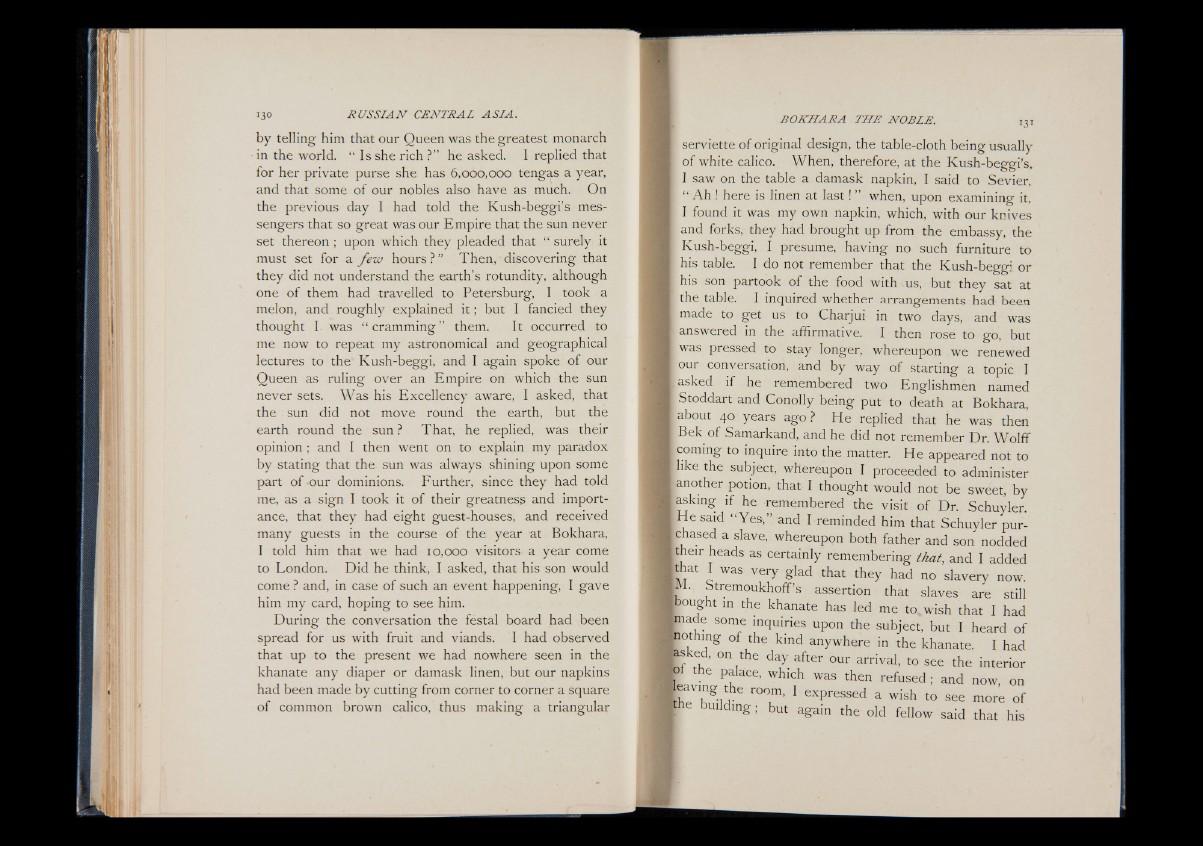
by telling him that our Queen was the greatest monarch
in the world. “ Is she rich ?” he asked. I replied that
for her private purse she has 6,000,000 tengas a year,
and that some of our nobles also have as much. On
the previous day I had told the Kush-beggi’s messengers
that so great was our Empire that the sun never
set thereon ; upon which they pleaded that “ surely it
must set for a few hours ? ” Then, * discovering that
they did not understand the earth’s rotundity, although
one of them had travelled to Petersburg, I took a
melon, and roughly explained i t ; but I fancied they
thought I was “ cramming” O O them. It occurred to
me now to repeat my astronomical and geographical
lectures to the Kush-beggi, and I again spoke of our
Queen as ruling over an Empire on which the sun
never sets. Was his Excellency aware, I asked, that
the sun did not move round the earth, but the
earth round the sun ? That, he replied, was their
opinion ; and I then went on to explain my paradox
by stating that the sun was always shining upon some
part of our dominions. Further, since they had told
me, as a sign I took it of their greatness and importance,
that they had eight guest-houses, and received
many guests in the course of the year at Bokhara,
I told him that we had 10,000 visitors- a year come
to London. Did he think, I asked, that his son would
come ? and, in case o f such an event happening, I gave
him my card, hoping to see him.
During the conversation the festal board had been
spread for us with fruit and viands. I had observed
that up to the present we had nowhere seen in the
khanate any diaper or damask linen, but our napkins
had been made by cutting from corner to corner a square
o f common brown calico, thus making a triangular
I serviette of original design, the table-cloth being usually
I of white calico. When, therefore, at the Kush-beggi’s,
I saw on the table a damask napkin, I said to Sevier,
I “ Ah ! here is linen at la s t ! ” when, upon examining it,
[ I found it was my own napkin, which, with our knives
I and forks, they had brought up from the embassy, the
I Kush-beggi, I presume, having no such furniture to
his table. I do not remember that the Kush-beggi or
1 his son partook of the food with us, but they sat at
I the table. I inquired whether arrangements had been
I made to get us to Charjui in two days, and was
I answered in the affirmative. I then rose to go, but
I was pressed to stay longer, whereupon we renewed
E our conversation, and by way of starting a topic I
I asked if he remembered two Englishmen named
I Stoddart and Conolly being put to death at Bokhara,
about 40 years ago? He replied that he was then
I Bek of Samarkand, and he did not remember Dr. Wolff
[coming to inquire into the matter. He appeared not to
¡like the subject, whereupon I proceeded to administer
(another potion, that I thought would not be sweet, by
tasking if he remembered the visit of Dr. Schuyler.
■He said “ Yes-,” and I reminded him that Schuyler purchased
a slave, whereupon both father and son nodded
the ir heads as certainly remembering that, and I added
that I was very glad that they had no slavery now.
M. Stremoukhoff’s assertion that slaves are still
■ought in the khanate has led me to, wish that I had
I made some inquiries upon the subject, but I heard o f
¡nothing of the kind anywhere in the khanate. I had
Jsked, °n the day after our arrival, to see the interior
| r 1 , J ^ ^ v a i , I U l i l t
I e palace> which was then refused; and now,low, on
on
le a v in g the room, I expressed a wish to se
1-Vm k.’ -u - , ' ~ — r - '~— wiau lu see more o f
■he building; but again the old fellow said that his